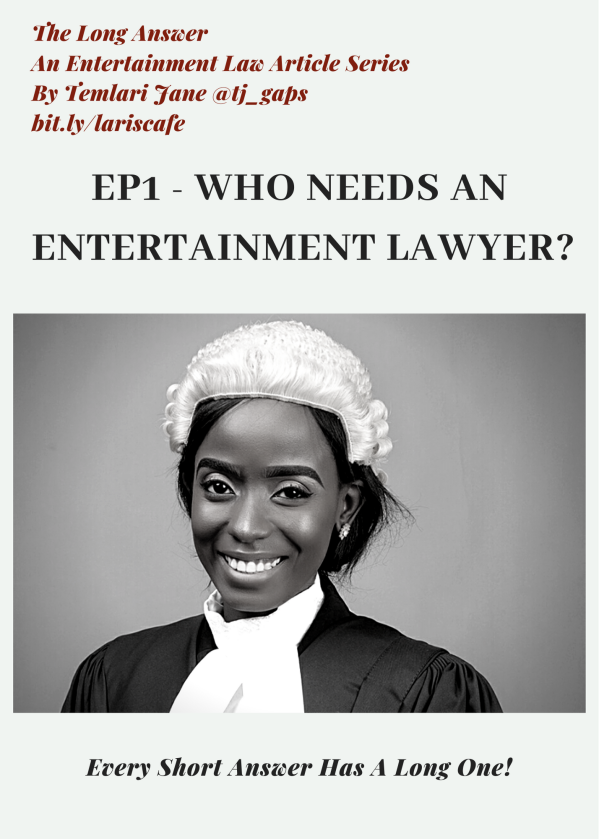In a time where many people are hustling to make money off the Entertainment Industry a lot of titles get thrown around; one of the latest is \”Entertainment Lawyer\”.
Who needs them? Like really, what\’s their use?
The Black\’s Law Dictionary defines Entertainment Law (Yep! Its a real thing) as the field of law dealing with the legal and business issues in the Entertainment Industry (such as film, music and theatre) and involving the representation of artistes and producers, the negotiation of contracts and the protection of intellectual-property rights. (This definition is from 1953 so have it at the back of your mind that some things have changed, well more like \’been added\’ since then.)
Contrary to Public Opinion Entertainment Lawyers aren\’t just Intellectual Property Lawyers. Every Entertainment Lawyer must be an IP expert but not every IP expert is an Entertainment Lawyer.
Did you see what I did there? If you didn\’t, go back and read again.

Intellectual Property is only a small fraction of Entertainment Law. Entertainment law is a broad area of law that requires a working knowledge of Project Management, Project Financing, Contract Law, Commercial Law, Tort Law, Criminal Law, Real Estate Law, Corporate Law, ADR, Taxation Law, Insurance Law and Intellectual Property Law amongst others.
However, Intellectual Property isn\’t only a part of Entertainment Law; it is actually an independent field of law on its own. Stay with me, Intellectual Property Law isn\’t just limited to the popular Entertainment-Specific right; Copyright. It also serves other areas like the internet, science, technology, medicine and even food production. So Intellectual Property Law isn\’t just for Entertainment, neither is Entertainment Law only about Intellectual property.
Here\’s an example;
Veren designs and builds a Music Box that detects moods and plays music accordingly. Her brother writes all the songs, her sister produces the beats and engineers the sound, then her close friends record their different voices per song.
She markets it and gains a lot of popularity among Vets, Pychiatrists and Psychologists and theres immediate demand.
So what does she do?
1.) She signs a Split sheet with all the contributors.
2.) She registers it as an industrial design under the Patent and Design Act.
3.) She registers the Songs under the Nigerian Copyright Act listing the writer, producer and performers.
4.) She registers the name of the Music Box under the Nigerian Trade mark Act.
5.) She gets investments.
6.) She registers a private company.
7.) She rents a workshop and hires people to help produce different designs of the music box.
8.) She buys insurance for the worshop and the products.
Veren has multiple intellectual properties belonging to different people which she could commercialize in different ways. She could sell all the rights to a pharmaceutical company and split the payment amongst all the contributors, or she could get VC funding or license the production to the Pharmaceutical company, license the music to a video game company, an advertising agency or even a TV show as their sound-track. Her options are limitless.
In this scenario, she is dealing with Intellectual Property both within and outside the Entertainment Industry. She is also dealing with law within and outside intellectual property.
Next, who do Entertainment Lawyers work for? (I\’m tempted to write Me and You, haha, but that\’s not necessarily true, their Clientele is pretty much limited to a specific group of people.) The short answer is; Entertainment Lawyers work for people connected to the Entertainment Industry. Who are these people? (Calm down, I\’m about to tell you.)
In the Music Corner of the Industry the clientele list include; Singers, Song Writers, Producers, Record Labels, Publishing Companies, Collecting Societies, Talent Management Agencies, PR firms, Event Organizers, Media Houses, Clubs, Dancers, Video Directors etc.
In Motion Picture they include; Actors, Stunt-men, Script-Writers, Directors, Producers, Distribution Companies, Graphic Designers, Animators, Union Groups, Set designers, Make-up artists, Stylists – You Know What? They basically work for the Cast and Crew and every other person who works with them from the time the movie idea is concieved to its execution and distribution. Whew!!! We\’re not done yet.
In the Games corner, the lawyers work for Graphic Artists, Coders, Manufacturers, Voice-Over Artists, Stunt-men, Distributors etc.
In Comedy, Arts and Literature, they work for Comics, Artists(Visual and Applied), Writers, Poets, Curators, Publishers, Galleries, Art dealers, Event Organizers, PR Companies, Distributors etc.
Wow! That\’s a lot of people. But still \”Not Everyone\” \”Not You and Me lol\” just the Industry.
Now to the Million Naira Question *drum rolls*; What do Entertainment Lawyers Actually Do?
Entertainment Lawyers primarily work to prevent disputes and increase profits for their Clients. They help build, secure and defend Brands and Businesses through Registrations, Project management, Brokering deals and Representation at meetings and disputes.
Their work is NOT TO FIGHT but to AVOID FIGHTS, but where necessary they\’ll FIGHT VICIOUSLY.
You can get the short answer on;
Streaming Platforms
1. Audiomack: https://audiomack.com/song/blackboyrecords/tsaep1aud-1
2.Soundcloud: https://soundcloud.com/blackboyrecords/tsaep1aud
Audio Download
1. https://my.notjustok.com/track/embed/id/432514\”
Subtitled Version
1. YouTube: https://youtu.be/TSgEoAfqXGI
Cheers!
Temlari Jane
@tj_gaps
DISCLAIMER
The content of this article is for general informational purposes only and shall neither constitute legal advice nor an agreement for legal services. Under no circumstances does the content of this article establish or create, directly or indirectly, an attorney-client relationship between you and the writer.

